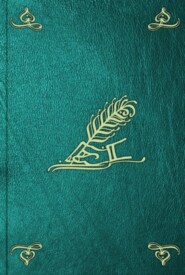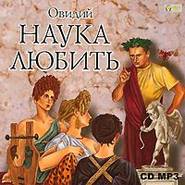По всем вопросам обращайтесь на: info@litportal.ru
(©) 2003-2024.
✖
The Amores; or, Amours
Настройки чтения
Размер шрифта
Высота строк
Поля
[ Io triumphe.—Ver. 25. 'Clamare triumphum,' means 'to shout Io triumphe,' as the procession moves along. Lactantius speaks of a poem called 'the Triumph of Cupid,' in which Jupiter and the other Gods were represented as following him in the triumphal procession.]
017 (return (#x1_x_1_i91))
[ Thyself with gold.—Ver. 42. The poet Mosehus represents Cupid as having wings of gold.]
018 (return (#x1_x_1_i92))
[ The Gangetic land.—Ver. 47. He alludes to the Indian triumphs of Bacchus, which extended to the river Ganges.]
019 (return (#x1_x_1_i92))
[ Thy kinsman Cæsar—Ver. 51. Because Augustus, as the adopted son of Julius Cæsar, was said to be descended from Venus, through the line of Æneas.]
020 (return (#x1_x_1_i92))
[ Shield the conquered.—Ver. 52. Although Augustus had many faults, it must be admitted that he was, like Julius, a most merciful conqueror, and was generally averse to bloodshed.]
021 (return (#x1_x_1_i96))
[ Founder of my family. —Ver. 8. See the Life of Ovid prefixed to the Fasti; and the Second Book of the Tristia.]
022 (return (#x1_x_1_i96))
[ Each of my parents.—Ver. 10. From this it appears that this Elegy was composed during the life-time of both of his parents, and while, probably, he was still dependent on his father.]
023 (return (#x1_x_1_i97))
[ No rover in affection.—Ver. 15. 'Desuitor,' literally means 'one who leaps off.' The figure is derived from those equestrians who rode upon several horses, or guided several chariots, passing from the one to the other. This sport was very frequently exhibited in the Roman Circus. Among the Romans, the 'desuitor' generally wore a 'pileus,' or cap of felt. The Numidian, Scythian, and Armenian soldiers, were said to have been skilled in the same art.]
024 (return (#x1_x_1_i97))
[ Of the bird.—Ver. 22. He alludes to Leda and Europa.]
026 (return (#x1_x_1_i101))
[ The same banquet.—Ver. 1. He says that they are about to meet at 'coena,' at the house of a common friend.]
027 (return (#x1_x_1_i101))
[ The last meal.—Ver. 2. The 'coena' of the Romans is usually translated by the word 'supper'; but as being the chief meal of the day, and being in general, (at least during the Augustan age) taken at about three o'clock, it really corresponds to our 'dinner.']
028 (return (#x1_x_1_i101))
[ Warm the bosom of another.—Ver. 5. As each guest while reclining on the couch at the entertainment, mostly leaned on his left elbow during the meal, and as two or more persons lay on the same couch, the head of one person reached to the breast of him who lay above him, and the lower person was said to lie on the bosom of the other. Among the Romans, the usual number of persons occupying each couch was three. Sometimes, however, four occupied one couch; while, among the Greeks, only two reclined upon it. In this instance, he describes the lady as occupying the place below her husband, and consequently warming his breast with her head. For a considerable time after the fashion of reclining at meals had been introduced into Rome, the Roman ladies sat at meals while the other sex was recumbent. Indeed, it was generally considered more becoming for females to be seated, especially if it was a party where many persons were present. Juvenal, however, represents a bride as reclining at the marriage supper on the bosom of her husband. On the present occasion, it is not very likely that the ladies were particular about the more rigid rules of etiquette. It must be remembered that before lying down, the shoes or sandals were taken off.]
029 (return (#x1_x_1_i101))
[ Damsel of Atrax.—Ver. 8. He alludes to the marriage of Hippodamia to Pirithous, and the battle between the Centaurs and the Lapithæ, described in the Twelfth-. Book of the Metamorphoses.]
031 (return (#x1_x_1_i102))
[ Do come first.—Ver. 14. He hardly knows why he asks her to do so, but still she must come before her husband; perhaps, that he may have the pleasure of gazing upon her without the chance of detection; the more especially as she would not recline till her husband had arrived, and would, till then, probably be seated.]
032 (return (#x1_x_1_i102))
[ Touch my foot.—Ver. 16. This would show that she had safely received his letter.]
033 (return (#x1_x_1_i102))
[ My secret signs.—Ver. 18. See the Note in this Volume, to the 90th line of the 17th Epistle.]
034 (return (#x1_x_1_i102))
[ By my eye-brows.—Ver. 19. See the 82nd line of the 17th Epistle.]
035 (return (#x1_x_1_i102))
[ Traced in the wine.—Ver. 20. See the 88th line of the 17th Epistle.]
036 (return (#x1_x_1_i102))
[ Your blooming cheeks.—Ver. 22. Probably by way of check to his want of caution.]
037 (return (#x1_x_1_i102))
[ Twisted on your fingers.—Ver. 26. The Sabines were the first to introduce the practice of wearing rings among the Romans. The Romans generally wore one ring, at least, and mostly upon the fourth finger of the left hand. Down to the latest period of the Republic, the rings were mostly of iron, and answered the'purpose of a signet. The right of wearing a gold ring remained for several centuries the exclusive privilege of Senators, Magistrates, and Knights. The emperors were not very scrupulous on whom they conferred the privilege of wearing the gold ring, and Severus and Aurelian gave the right to all Roman soldiers. Vain persons who had the privilege, literally covered their fingers with rings, so much so, that Quintilian thinks it necessary to warn the orator not to have them above the middle joint of the fingers. The rings and the gems set in them, were often of extreme beauty and value. From Juvenal and Martial we learn that the coxcombs of the day had rings for both winter and summer wear. They were kept in 'dactyliothecæ,' or ring boxes, where they were ranged in a row.]
038 (return (#x1_x_1_i102))
[ Who are in prayer.—Ver. 27. It was the custom to hold the altar while the suppliant was praying to the Deities; he here directs her, while she is mentally uttering imprecations against her husband, to fancy that the table is the altar, and to take hold of it accordingly.]
039 (return (#x1_x_1_i102))
[ If you are discreet.—Ver. 29. Sapias' is put for 'si sapias,' 'if you are discreet,' 'if you would act sensibly.']
041 (return (#x1_x_1_i102))
[ Ask the servant.—Ver. 30. This would be the slave, whose office it was to mix the wine and water to the taste of the guests. He was called [oivôxooç] by the Greeks, 'pincerna' by the Romans.]
042 (return (#x1_x_1_i102))
[ Which you have put down.—Ver. 31. That is, which she either puts upon the table, or gives back to the servant, when she has drunk.]
043 (return (#x1_x_1_i102))
[ Touched by his mouth.—Ver. 34. This would appear to refer to some choice morsel picked out of the husband's plate, which, as a mark of attention, he might present to her.]
044 (return (#x1_x_1_i102))
017 (return (#x1_x_1_i91))
[ Thyself with gold.—Ver. 42. The poet Mosehus represents Cupid as having wings of gold.]
018 (return (#x1_x_1_i92))
[ The Gangetic land.—Ver. 47. He alludes to the Indian triumphs of Bacchus, which extended to the river Ganges.]
019 (return (#x1_x_1_i92))
[ Thy kinsman Cæsar—Ver. 51. Because Augustus, as the adopted son of Julius Cæsar, was said to be descended from Venus, through the line of Æneas.]
020 (return (#x1_x_1_i92))
[ Shield the conquered.—Ver. 52. Although Augustus had many faults, it must be admitted that he was, like Julius, a most merciful conqueror, and was generally averse to bloodshed.]
021 (return (#x1_x_1_i96))
[ Founder of my family. —Ver. 8. See the Life of Ovid prefixed to the Fasti; and the Second Book of the Tristia.]
022 (return (#x1_x_1_i96))
[ Each of my parents.—Ver. 10. From this it appears that this Elegy was composed during the life-time of both of his parents, and while, probably, he was still dependent on his father.]
023 (return (#x1_x_1_i97))
[ No rover in affection.—Ver. 15. 'Desuitor,' literally means 'one who leaps off.' The figure is derived from those equestrians who rode upon several horses, or guided several chariots, passing from the one to the other. This sport was very frequently exhibited in the Roman Circus. Among the Romans, the 'desuitor' generally wore a 'pileus,' or cap of felt. The Numidian, Scythian, and Armenian soldiers, were said to have been skilled in the same art.]
024 (return (#x1_x_1_i97))
[ Of the bird.—Ver. 22. He alludes to Leda and Europa.]
026 (return (#x1_x_1_i101))
[ The same banquet.—Ver. 1. He says that they are about to meet at 'coena,' at the house of a common friend.]
027 (return (#x1_x_1_i101))
[ The last meal.—Ver. 2. The 'coena' of the Romans is usually translated by the word 'supper'; but as being the chief meal of the day, and being in general, (at least during the Augustan age) taken at about three o'clock, it really corresponds to our 'dinner.']
028 (return (#x1_x_1_i101))
[ Warm the bosom of another.—Ver. 5. As each guest while reclining on the couch at the entertainment, mostly leaned on his left elbow during the meal, and as two or more persons lay on the same couch, the head of one person reached to the breast of him who lay above him, and the lower person was said to lie on the bosom of the other. Among the Romans, the usual number of persons occupying each couch was three. Sometimes, however, four occupied one couch; while, among the Greeks, only two reclined upon it. In this instance, he describes the lady as occupying the place below her husband, and consequently warming his breast with her head. For a considerable time after the fashion of reclining at meals had been introduced into Rome, the Roman ladies sat at meals while the other sex was recumbent. Indeed, it was generally considered more becoming for females to be seated, especially if it was a party where many persons were present. Juvenal, however, represents a bride as reclining at the marriage supper on the bosom of her husband. On the present occasion, it is not very likely that the ladies were particular about the more rigid rules of etiquette. It must be remembered that before lying down, the shoes or sandals were taken off.]
029 (return (#x1_x_1_i101))
[ Damsel of Atrax.—Ver. 8. He alludes to the marriage of Hippodamia to Pirithous, and the battle between the Centaurs and the Lapithæ, described in the Twelfth-. Book of the Metamorphoses.]
031 (return (#x1_x_1_i102))
[ Do come first.—Ver. 14. He hardly knows why he asks her to do so, but still she must come before her husband; perhaps, that he may have the pleasure of gazing upon her without the chance of detection; the more especially as she would not recline till her husband had arrived, and would, till then, probably be seated.]
032 (return (#x1_x_1_i102))
[ Touch my foot.—Ver. 16. This would show that she had safely received his letter.]
033 (return (#x1_x_1_i102))
[ My secret signs.—Ver. 18. See the Note in this Volume, to the 90th line of the 17th Epistle.]
034 (return (#x1_x_1_i102))
[ By my eye-brows.—Ver. 19. See the 82nd line of the 17th Epistle.]
035 (return (#x1_x_1_i102))
[ Traced in the wine.—Ver. 20. See the 88th line of the 17th Epistle.]
036 (return (#x1_x_1_i102))
[ Your blooming cheeks.—Ver. 22. Probably by way of check to his want of caution.]
037 (return (#x1_x_1_i102))
[ Twisted on your fingers.—Ver. 26. The Sabines were the first to introduce the practice of wearing rings among the Romans. The Romans generally wore one ring, at least, and mostly upon the fourth finger of the left hand. Down to the latest period of the Republic, the rings were mostly of iron, and answered the'purpose of a signet. The right of wearing a gold ring remained for several centuries the exclusive privilege of Senators, Magistrates, and Knights. The emperors were not very scrupulous on whom they conferred the privilege of wearing the gold ring, and Severus and Aurelian gave the right to all Roman soldiers. Vain persons who had the privilege, literally covered their fingers with rings, so much so, that Quintilian thinks it necessary to warn the orator not to have them above the middle joint of the fingers. The rings and the gems set in them, were often of extreme beauty and value. From Juvenal and Martial we learn that the coxcombs of the day had rings for both winter and summer wear. They were kept in 'dactyliothecæ,' or ring boxes, where they were ranged in a row.]
038 (return (#x1_x_1_i102))
[ Who are in prayer.—Ver. 27. It was the custom to hold the altar while the suppliant was praying to the Deities; he here directs her, while she is mentally uttering imprecations against her husband, to fancy that the table is the altar, and to take hold of it accordingly.]
039 (return (#x1_x_1_i102))
[ If you are discreet.—Ver. 29. Sapias' is put for 'si sapias,' 'if you are discreet,' 'if you would act sensibly.']
041 (return (#x1_x_1_i102))
[ Ask the servant.—Ver. 30. This would be the slave, whose office it was to mix the wine and water to the taste of the guests. He was called [oivôxooç] by the Greeks, 'pincerna' by the Romans.]
042 (return (#x1_x_1_i102))
[ Which you have put down.—Ver. 31. That is, which she either puts upon the table, or gives back to the servant, when she has drunk.]
043 (return (#x1_x_1_i102))
[ Touched by his mouth.—Ver. 34. This would appear to refer to some choice morsel picked out of the husband's plate, which, as a mark of attention, he might present to her.]
044 (return (#x1_x_1_i102))














